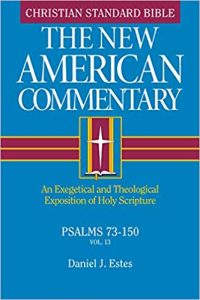Daniel J. Estes is the author of Psalms 73-150: An Exegetical and Theological Exposition of Holy Scripture in the New American Commentary series. Dr. Estes (Ph.D. in Biblical Exegesis, Cambridge University) is Distinguished Professor of Old Testament at Cedarville University.

Dr. Estes was reared in a pastor’s family in small towns in upstate New York.
Because of the teaching he received from his parents, he came to know Christ as a child, and then the Lord used numerous experiences at summer camp, church, college, and ministry to continue to build into his life.
Now as a Bible professor, he considers it a privilege to do for others what so many godly mentors did for him.
Dr. Estes is also the author of Handbook on the Wisdom Books and Psalms, Hear, My Son: Teaching & Learning in Proverbs 1-9 in the New Studies in Biblical Theology, and Job in the Teach the Text Commentary Series.
Which commentary series is best for your purposes? See Best Bible Commentaries: Top 50. Based on aggregate reviews.
7 Questions on Psalms in the New American Commentary Series
Recently, Dr. Estes graciously answered my questions about his Psalms commentary. Readers will learn how this commentary came to be, what is distinct about it among Psalms commentaries, and how the project edified him personally.
1. What previous research and/or personal interests led you to this project and helped prepare you to write this commentary on Psalms 73-150?
I remember memorizing Psalm 23 and several other passages form the Psalms when I was a young boy. When I became a pastor, I found myself attracted to the Psalms, because they speak with such relevance to life and so powerfully about the Lord. For over thirty years I have taught a course on Psalms at Cedarville University, and I have published several articles and essays on subjects on the Psalms. For ten years I have served on the steering committee for the ETS section on Psalms and Hebrew Poetry.
2. Who is the intended audience for this commentary?
This commentary on Psalms 73-150 is part of the New American Commentary series. The stated focus of the NAC indicates that its conviction is that the Bible primarily belongs to the church, so its intended audience is pastors, teachers, scholars, and students who study and teach the Bible in various settings. As I wrote this volume I did not endeavor to speak as a scholar exclusively to other scholars, but to translate the best of scholarship on the Psalms into language that is understandable and relevant to the church as a whole.
3. What is unique about this commentary? What contribution does it make to studies on the Psalms?
I have come to the Psalms with a background in literature and church music, so I have tried to make good use of these sensitivities as I read and respond to the Psalms. Because the Psalms are poetry, they must be read as poetry and not flattened into prose. They were originally employed in the worship of ancient Israel and later as well in the early church, so they expect a response from those who read and sing them. In other words, they must be appreciated as prompts to worship the Lord, and not just analyzed for their theology.
4. What section or passage of this commentary was particularly memorable to research and write?
The Psalter could be likened to a box of chocolates, with each song yielding its own distinctive delight. All of the Psalms are enriching, even those that deal with the greatest pains in life. But I have found special joy in studying and appropriating songs of trust, such as Psalms 91 and 121, because they are such great reminders of why I can feel confident in the Lord.
5. What personally edified you in writing this commentary, increasing your affections for Christ?
In the Psalms, theology comes crashing into experience, and in that collision faith is forged. I have learned to rejoice in the Lord as I have responded to the praise psalms. The lament psalms have shown me how to depend on the Lord in the tough times of life. The Psalms in so many ways have taught me to appreciate the Lord’s wisdom, justice, grace, and forgiveness as I have contemplated how his greatness and goodness are reflected across the whole range of experience. In short, the Psalms have again and again pointed me to the Lord, and cultivated my worship of the Triune God.
6. Besides your commentary, what are your top recommended books on Psalms?
There are so many excellent commentaries and monographs on the Psalms, and I have drawn much from what others have written. At the top of my personal list are the three-volume sets by John Goldingay and Allen Ross, and the two volumes by Hassell Bullock, because they integrate scholarly exegesis with pastoral sensitivity.
7. What is next for you? What project are you currently working on?
I am nearing completion of a volume on The Message of Wisdom for The Bible Speaks Today series. Then I have four articles on aspects of the Psalms and Old Testament Wisdom that I am committed to write over the next year, and I will also begin work on the Psalms 1-72 volume for the New American Commentary. My deadline for that manuscript is the end of 2023, so it will likely be released in late 2024.
Own Daniel Estes’ Psalms commentary in the New American Commentary series
- Get Daniel Estes’ Psalms commentary on Amazon
- Get Daniel Estes’ Psalms commentary on Christian Book Distributors
Recent Posts
David Jeremiah, a renowned pastor, author, and speaker, has captivated the hearts of many with his compelling sermons. His messages resonate deeply with diverse audiences, leaving an enduring...
Tim Keller, a distinguished pastor, theologian, and author, has garnered a devoted following through the profound impact of his sermons. In this article, we will explore seven compelling reasons...
